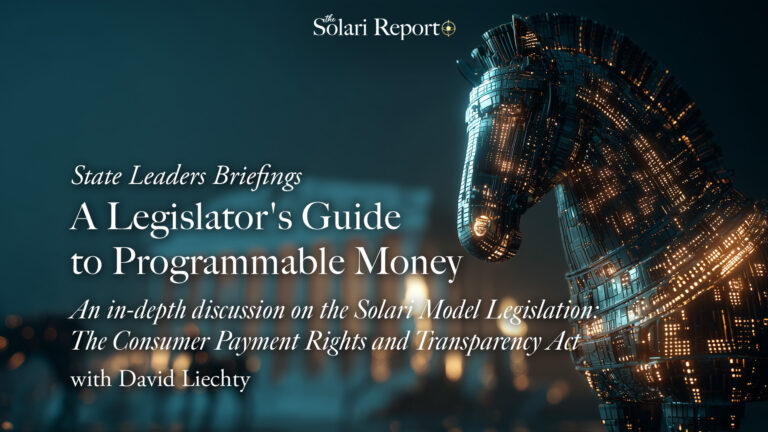
Caveat Emptor: Why Investors Need to Do Due Diligence on U.S. Treasury and Related Securities
Become a member: Subscribe
- Money & Markets
- Weekly Solari Reports
- Cognitive Liberty
- Young Builders
- Ask Catherine
- News Trends & Stories
- Equity Overview
- War For Bankocracy
- Digital Money, Digital Control
- State Leader Briefings
- Food
- Food for the Soul
- Future Science
- Health
- Metanoia
- Solutions
- Spiritual Science
- Wellness
- Building Weatlh
- Via Europa
Solari’s Building Wealth materials are organized to inspire and support your personal strategic and financial planning.

Missing Money
Articles and video discussions of the $21 Trillion dollars missing from the U.S. government
No posts
- LATEST
- TOP SECTIONS
- SERIES
- Money & Markets
- Weekly Solari Reports
- Ask Catherine
- News Trends & Stories
- Equity Overview
- Cognitive Liberty
- Young Builders
- Building Wealth
- The War for Bankocracy
- Digital Money, Digital Control
- State Leader Briefings
- Food
- Food for the Soul
- Future Science
- Health
- Metanoia
- Solutions
- Spiritual Science
- Wellness
- Via Europa
- BLOGS
- RESOURCES
- COMMUNITY
- My Account
- Log In
- Subscribe
- Search
- Shop
- Support
- Donate
- Log Out
The Papers
$21 Trillion Missing
- Missing Money 2021 Update
- Missing Money 2020 Update
- Thrift Savings Fund—Treasury Account 026×61531
- FASAB Standard 56 and the Authority of the Director of National Intelligence to Waive SEC Financial Reporting
News Coverage
Video Page
Case Studies
Space: The New Frontier For The Central Control Grid
Legal Series – US Monetary and Fiscal Operations
- he Appropriations Clause: A History of the Constitution’s (As of Yet) Underused Clause
- The U.S. Statutes Creating Modern Constitutional Financial Management and Reporting Requirements and the Government’s Failure to Follow Them
- The Black Budget: The Crossroads of (Un)Constitutional Appropriations and Reporting
- FASAB Statement 56: Understanding New Government Financial Accounting Loopholes
- National Security Exemptions and SEC Rule 10b-5
- Classification for Investors 101
- The History and Organization of the Federal Reserve: The What and Why of the United States’ Most Powerful Banking Organization
FASAB Statement 56
Missing Money Chronology
#my212020 & #constantamazement
The Real Game of Missing Money
- FASAB Standard 56 and the Authority of the Director of National Intelligence to Waive SEC Financial Reporting
- Should We Care about Secrecy in Financial Reporting?
- Reports on “Unsupported Journal Voucher Adjustments” for DOD & HUD
- Contractors, Investors, and Dealers
- Missing Money: A Personal History – 1989 to 2019
- Coming Clean Beyond the Fiscal Cliff
The Financial Coup & Missing Money: Quotes
Caveat Emptor
Dillon Read
Lighthouse Economics
Caveat Emptor: Why Investors Need to Do Due Diligence on U.S. Treasury and Related Securities

Now added to the 2018 Annual Wrap Up Web Presentation:
Caveat Emptor: Why Investors Need to Do Due Diligence on U.S. Treasury and Related Securities
~ February 18, 2019 ~
I. Introduction
II. Which Securities and Financial Assets Are Affected by FASAB 56?
III. The Rating Agencies
IV. Laws Related to U.S. Monetary and Fiscal Policy
V. FASAB 56: Recent Events Leading Up to FASAB 56
VI. FASAB 56: The Final Statement
VII. FASAB 56: What Is the “National Security” Information That May Be the Subject of Modifications?
VIII. Existing Securities Laws That Have the Effect of Reducing Transparency for National Security Purposes
IX. The Post FASAB 56 World: Who Can Help Assess Credit, Risks, and Price?
X. The Post FASAB 56 World: What Is the Federal Credit?
XI. Conclusion
XII. Links
XIII. Appendices A & B
Excerpt:
“In this article, we explain, with reference to other materials available on The Solari Report site, that it is no longer prudent for the investor to rely solely upon primary and secondary securities dealers, the U.S. rating agencies, and mandatory disclosure by issuers to accurately assess the risks and values of certain securities. While we encourage investors to do their own due diligence, we also recognize that FASAB 56 eliminates any hope that the investor will be able to obtain sufficient information to accurately assess the credit and value of his or her holdings of U.S. Treasury and other securities whose values are affected by Statement 56 (i.e., a meaningful percentage of U.S. public and private equity and debt securities). ”
Full article here.
16 Comments
Comments are closed.
Our mission is to help you live a free and inspired life. This includes building wealth in ways that build real wealth in the wider economy. We believe that personal and family wealth is a critical ingredient of both individual freedom and community, health and well-being.
Nothing on The Solari Report should be taken as individual investment, legal, or medical advice. Anyone seeking investment, legal, medical, or other professional advice for his or her personal situation is advised to seek out a qualified advisor or advisors and provide as much information as possible to the advisor in order that such advisor can take into account all relevant circumstances, objectives, and risks before rendering an opinion as to the appropriate strategy.
Be the first to know about new articles, series and events.

16 Comments
-
Catherine, the darkness of FASAB 56 is in direct contrast to legislative transparency an ex-Wall Street lawyer, Caitlin Long (https://caitlin-long.com/about/), has been pushing at the individual state level (eg., recently Wyoming). As I understand her work, it is to provide an alternative legal/financial framework to the wildly broken system you describe.
You might consider her work as a constructive initiative toward better alternatives … a positive force bringing light to darkness.-
Thanks – will take a look.
-
Comments are closed.




















































































































Catherine, the darkness of FASAB 56 is in direct contrast to legislative transparency an ex-Wall Street lawyer, Caitlin Long (https://caitlin-long.com/about/), has been pushing at the individual state level (eg., recently Wyoming). As I understand her work, it is to provide an alternative legal/financial framework to the wildly broken system you describe.
You might consider her work as a constructive initiative toward better alternatives … a positive force bringing light to darkness.
Thanks – will take a look.